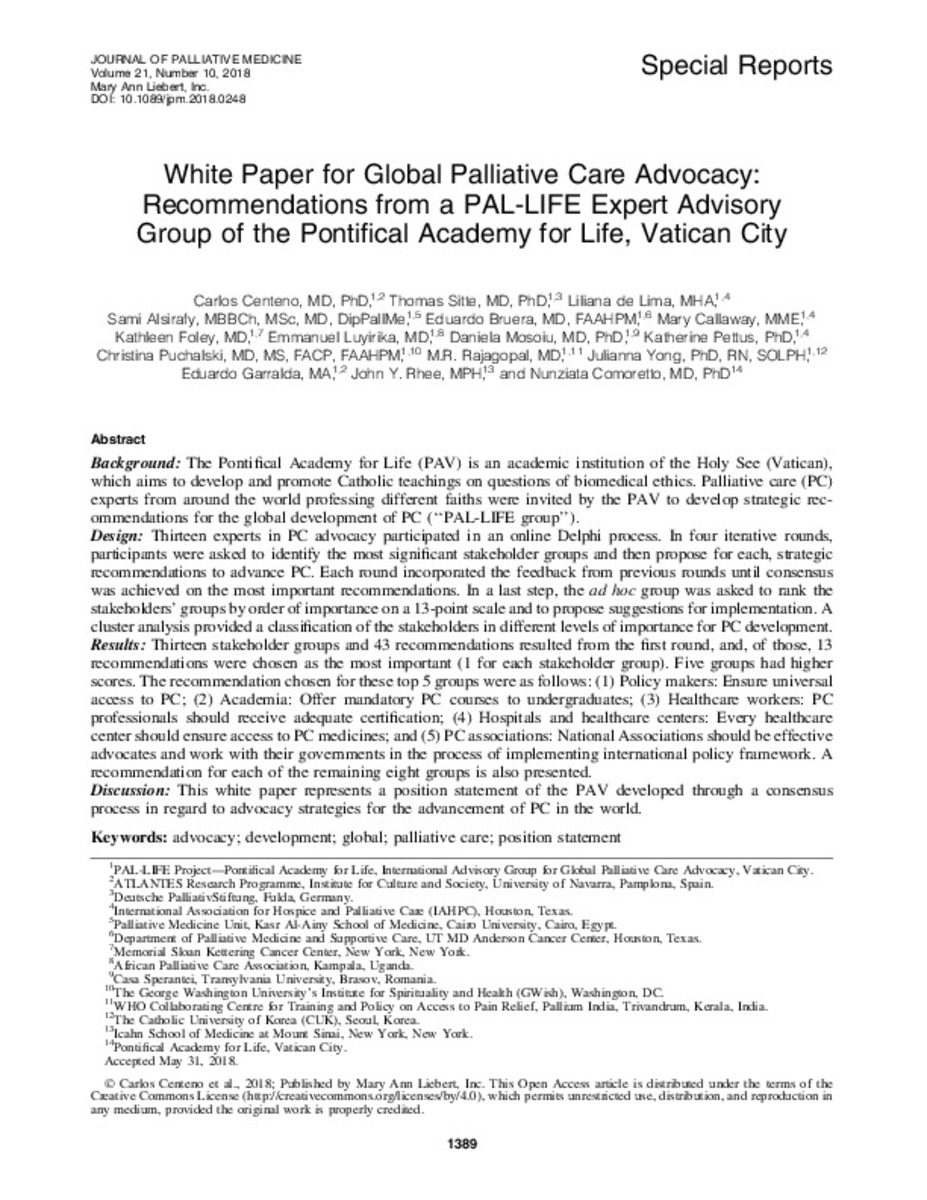Full metadata record
| DC Field | Value | Language |
|---|---|---|
| dc.creator | Centeno, C. (Carlos) | - |
| dc.creator | Sitte, T. (T.) | - |
| dc.creator | Lima, L. (Liliana) de | - |
| dc.creator | Alsirafy, S. (S.) | - |
| dc.creator | Bruera, E. (E.) | - |
| dc.creator | Callaway, M. (M.) | - |
| dc.creator | Foley, K. (K.) | - |
| dc.creator | Luyirika, E. (Emmanuel) | - |
| dc.creator | Mosoiu, D. (Daniela) | - |
| dc.creator | Pettus, K. (K.) | - |
| dc.creator | Puchalski, C. (C.) | - |
| dc.creator | Rajagopal, M.R. (M. R.) | - |
| dc.creator | Yong, J. (J.) | - |
| dc.creator | Garralda, E. (Eduardo) | - |
| dc.creator | Rhee, J.Y. (John Y.) | - |
| dc.creator | Comoretto, N. (Nunciata) | - |
| dc.date.accessioned | 2018-12-21T13:33:50Z | - |
| dc.date.available | 2018-12-21T13:33:50Z | - |
| dc.date.issued | 2018 | - |
| dc.identifier.citation | Centeno, C., Sitte, T., de Lima, L., Alsirafy, S., Bruera, E., Callaway, M., et al. White Paper for Global Palliative Care Advocacy: recommendations from a PAL-LIFE Expert Advisory Group of the Pontifical Academy for Life, Vatican City. Journal of Palliative Medicine, 21(10), 1389–1397. | es_ES |
| dc.identifier.issn | 1096-6218 | - |
| dc.identifier.uri | https://hdl.handle.net/10171/56051 | - |
| dc.description.abstract | Background: The Pontifical Academy for Life (PAV) is an academic institution of the Holy See (Vatican), which aims to develop and promote Catholic teachings on questions of biomedical ethics. Palliative care (PC) experts from around the world professing different faiths were invited by the PAV to develop strategic recommendations for the global development of PC (“PAL-LIFE group”). Design: Thirteen experts in PC advocacy participated in an online Delphi process. In four iterative rounds, participants were asked to identify the most significant stakeholder groups and then propose for each, strategic recommendations to advance PC. Each round incorporated the feedback from previous rounds until consensus was achieved on the most important recommendations. In a last step, the ad hoc group was asked to rank the stakeholders' groups by order of importance on a 13-point scale and to propose suggestions for implementation. A cluster analysis provided a classification of the stakeholders in different levels of importance for PC development. Results: Thirteen stakeholder groups and 43 recommendations resulted from the first round, and, of those, 13 recommendations were chosen as the most important (1 for each stakeholder group). Five groups had higher scores. The recommendation chosen for these top 5 groups were as follows: (1) Policy makers: Ensure universal access to PC; (2) Academia: Offer mandatory PC courses to undergraduates; (3) Healthcare workers: PC professionals should receive adequate certification; (4) Hospitals and healthcare centers: Every healthcare center should ensure access to PC medicines; and (5) PC associations: National Associations should be effective advocates and work with their governments in the process of implementing international policy framework. A recommendation for each of the remaining eight groups is also presented. Discussion: This white paper represents a position statement of the PAV developed through a consensus process in regard to advocacy strategies for the advancement of PC in the world. | es_ES |
| dc.language.iso | eng | es_ES |
| dc.publisher | Mary Ann Liebert | es_ES |
| dc.rights | info:eu-repo/semantics/openAccess | es_ES |
| dc.subject | Advocacy | es_ES |
| dc.subject | Development | es_ES |
| dc.subject | Global | es_ES |
| dc.subject | Palliative care | es_ES |
| dc.subject | Position statement | es_ES |
| dc.subject | Materias Investigacion::Ciencias de la Salud | es_ES |
| dc.title | White paper for global Palliative Care advocacy: recommendations from a PAL-LIFE expert advisory Group of the Pontifical Academy for Life, Vatican City | es_ES |
| dc.type | info:eu-repo/semantics/article | es_ES |
| dc.description.note | This Open Access article is distributed under the terms of the Creative Commons License (http://creativecommons.org/licenses/by/4.0) | es_ES |
| dc.identifier.doi | https://doi.org/10.1089/jpm.2018.0248 | es_ES |
Files in This Item:
Statistics and impact
Items in Dadun are protected by copyright, with all rights reserved, unless otherwise indicated.






